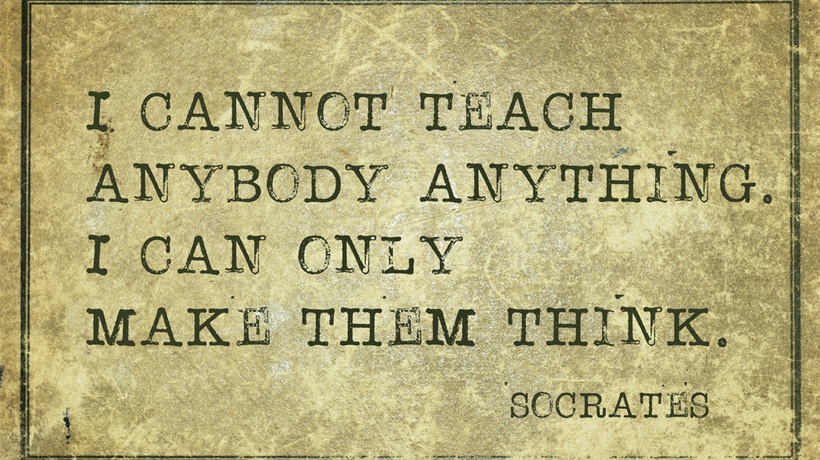What Socrates Can Tell Us About Questioning As The Engine Of Learning And Training
Socrates knew that without their participation his students would never be complicit in the ideas they discussed, and therefore would not feel they had a voice in their own development as a thinker. And he knew that it is best to examine ideas in a group. In other words, his sessions were not instructor-led; not didactic. They were a group endeavor focused on the interrogation of a thesis –or hypothesis– until the thesis was either adapted or abandoned. He called his method maieutic after the Greek word for midwife. He saw himself as only the midwife for ideas; not the one giving birth to them. In today’s parlance, the guide on the side. Socrates was using questioning by counting on two realities:
- The best way to identify and solve a problem is by using our natural curiosity.
- Only when an answer is followed by yet another question does learning proceed.
Here is my attempt to restore questioning to its rightful place; as the engine of training and learning.
My Reasoning
The vast majority of answers, which we readily give to our students beginning in school and extending into the workplace, are of course facts. Water boils at 100 centigrade. This is a factual answer to a question. And there are millions of them – questions that can be answered definitively and are universally and objectively true. And we can use a computer to test how well those facts have been retained by a person.
Here’s the problem; when students become employees they will rarely if ever be asked to answer a question that has a factual answer, because the answer is objective and already known; why pay someone to only know established facts? A question that is becoming ever more relevant in this age of digital assistants.
More likely - in fact certainly - employees will be asked to prove their worth by answering subjective questions, or more correctly forming an opinion about a subjective question, which by definition does not have a correct answer, only a well thought out opinion or point-of-view. You cannot use a computer to measure how well a person handles a subjective issue - yet. Only time will prove whether or not the opinion was an adequate solution to a subjective question. Think marriage or home buying. Can you prove which spouse or house is right for you? Or do you have to wait to see if your best guess was the right one?
Herein lies the problem for schools and businesses: The person being asked to evaluate a subjective problem and come up with a well thought-out opinion has never been trained to do so. He or she has only ever been given answers to factual questions, and then tested on how well they have retained the facts. And life in general and business in particular is not about facts, it is about choosing best options; and that means thinking along with team mates.
Boeing has thousands of engineers who know the objective facts of their profession. If one retires it is easy for Boeing to replace that engineer. The visioneers who tackle the tough, subjective questions, such as what are the best ways to improve fuel consumption, however, must possess more than an ability to search for and utilize established facts, they need the intangible gift of hypothetical questioning. And they, not the run-of-the-mill engineers, make a difference.
The same is true in your industry. Do you want memorization experts? Some, yes of course! Do you also need those visioneers who question, and question and question again? If you want to innovate and survive your answer must be YES! And you want them at all levels of the organization.
So, the question before you is not if you should implement a method that leverages the innate curiosity of your team using Questions as a means of achieving Critical Thinking, Collaboration, Problem-Solving and Communications, but how?
Either watch the free twenty minute tutorial here, or today and tomorrow only my book A Thought Leader's Guide To Enterprise Teams is free.
“It gets results.” - Alan Solinger Ph.D.
“This is a must for anyone engaged human capital development.” - Ann Miller PMP
“If people convince themselves of the need to learn the fire ignites within. Having their feet held to the fire has the opposite effect.” - Alex Terego
Please, share.









